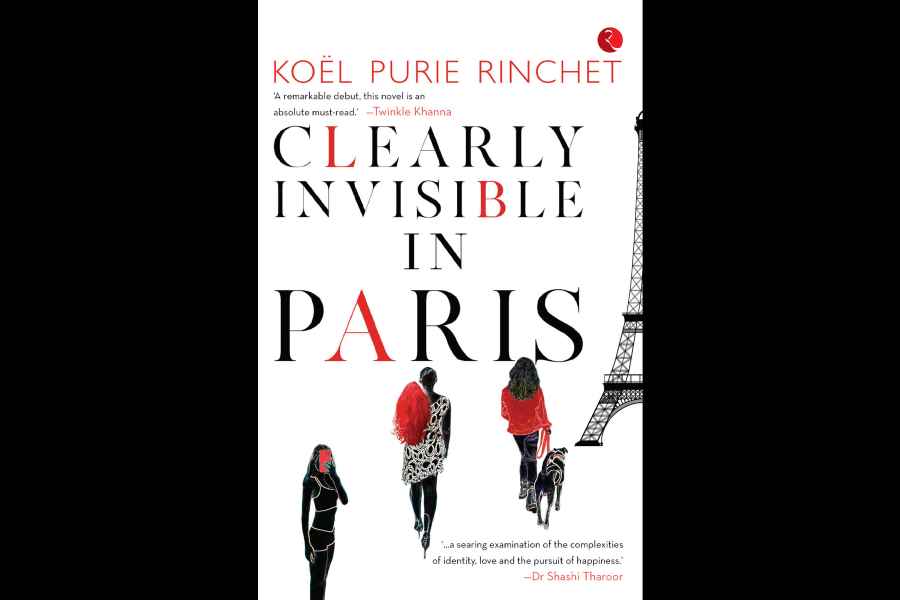Already a multi-hyphenate talent, Koel Purie Rinchet adds a new feather in her cap. The actor-TV presenter and producer has now turned a writer with her fiction Clearly Invisible in Paris. The "slow reader and fast writer" brings the dynamics of four women in Paris and dwells on the theme of identity and belonging. A chat with Koel on her debut book, her writing style and upcoming screen and stage projects.
For how long have you delved on the idea of Clearly Invisible In Paris?
The idea of outsiders in the ‘city of aloof’ started forming quite organically after about a year of living in Paris, which is more than four years ago now. But I only put pen to paper post the pandemic. I’m a slow reader but a fast writer and I finished the first complete draft within six months!
That’s incredible! Tell us what made you choose Paris as a setting and not any other city in the world.
I’ve loved and lived in many cities that I was not born in but no city has challenged my sense of self and belonging like Paris has. This story is unique to Paris, a city where I found most people like to live in their comfortable watertight silos with their unchangeable time slots and inflexible mindsets. While the story of identity and feeling like an outsider could take place in any country, and at times, even within your own country, this particular story is unique to Paris and the city itself is an irreplaceable catalyst for the events in the plot to unfold.
Did you always have four women as your lead in mind?
The dynamic of four people, especially women, has always worked well for me. With three there is usually a danger of one feeling left out but with four the energy and groupings are more fluid and continuously change. My new play Mummy’s Dead, Long Live Mummy! has four mothers in it too. My girl gang in school, whose acronym was KAGS, had four members and we continue to be the closest friends. So, I guess it’s by design and not by default.
Tell us about the process of building up the four characters — Neera, Rosel, Violet and Dasha. Are they inspired by anyone in real life?
The initial idea of each character is an amalgamation of people I either know or have read or heard about. Once I had the initial idea of who they were I backed it up with intense research and a lot of imagination. And yes, of course, all of them have some trait or part of me in them too.
Your style is free-flowing yet crisp and bold. How was it discovering your style as a debut author?
My writing style, I think, is an extension of my personality: free-flowing, non-conformist, bold and full of invention. I’d like to believe it is also cheeky and fun. My literary agent once told me that I am ‘method writing’ because I was first immersing myself in the experiences I wanted my characters to have. But for me, it’s the only way to write; if I don’t know what something feels like how can I write about it?
Who are your literary influences?
I adore the writings of Ann Patchett, Madeline Miller, Erin Morgenstern, Anuja Chauhan, Salman Rushdie, Amor Towles, Marian Keyes, Ayobami Adebayo, Janet Skeslien Charles, Raven Leilani, Donna Tratt, Twinkle Khanna and the list goes on and on.
You have got quite a star-studded review for the book with the likes of Zoya Akhtar, Shobhaa De and Anuja Chauhan writing about it. How confident does it make you feel?
It’s nerve-wracking to send your writing out to the authors and creators you admire. Once they agreed to read it I spent many sleepless nights, doubting every comma, rethinking every line and plot point. Anuja Chauhan, whose books I’m a big fan of, was the first to respond and she messaged me the day she received it, “…very hard to put down… will finish tonight itself, I think!”
Then slowly the other endorsements started coming in and I was walking on air. I’m not a confident writer, although, I love my own writing and write for the joy it gives me. But once again, I have a nervous knot inside me as I await the verdict of the general reader and the market, they will be the ultimate deciders of the fate of Clearly Invisible in Paris.
The plot goes beyond four women meeting by chance and connecting over common issues. Tell us more.
The novel is about odd friendships but all the characters in my book, not just the protagonists, are flawed broken people, who constantly make bad choices. I’m attracted to imperfection and you’ll find me eulogising that a lot in my novel. The characters and their friendships rest on top of many themes — who gets to be an expat and who an immigrant; insider/ outsider complex; creating an identity from scratch; survival by whatever means… and some smaller themes of burnout, deception, hatred for anyone who’s considered “other”. Though I rarely offer solutions for the problems my characters encounter because I don’t believe in perfect endings, there is plenty of celebration and joy in my story.
What next?
My play Mummy’s Dead, Long Live Mummy! that I wrote and performed in earlier this year will tour in India and London in September and October. I’m also developing William Dalrymple’s Kohinoor for screen but that’s a slow and long process. Next, I’ll be seen in Zoya’s Archies and Rajat Kapoor’s Everybody Loves Handa. Also, I’m toying with a fantastically chilling new idea for a mini-series that originates in the hardest parts of India and ends up in the aristocratic living rooms of Paris.
